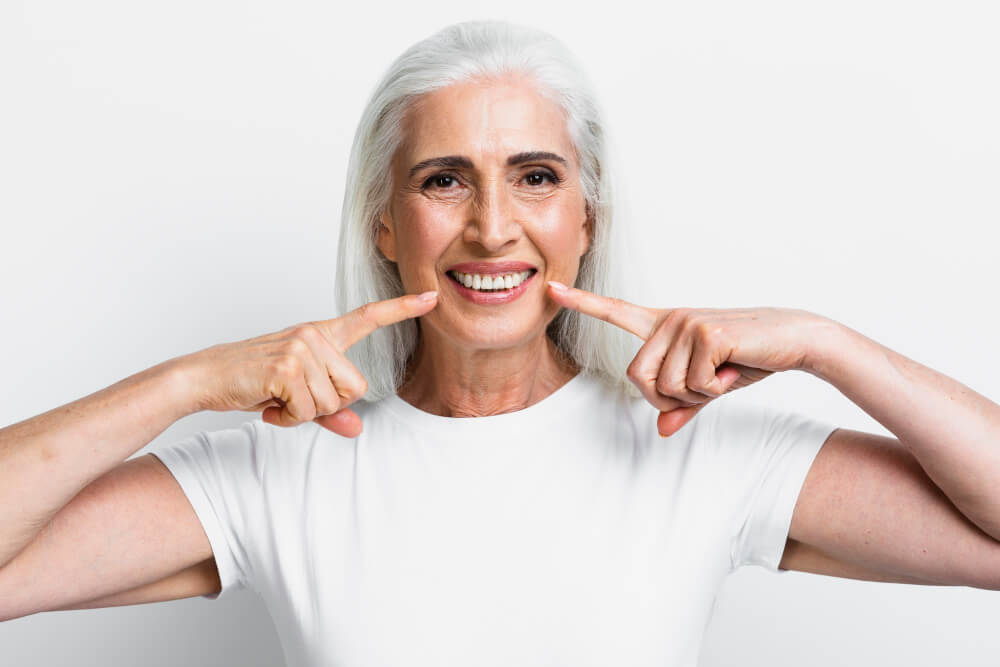Fixed Partial Denture: Benefits, Types & Procedure

Do you have a gap in your smile due to missing teeth? If so, fixed partial dentures may be the solution you’ve been looking for.
Fixed partial dentures (or dental bridges) can fill vacant spaces with a natural-looking tooth or teeth and bridge the gap between existing teeth. The replacement tooth remains firmly in place using either metal wings attached to adjacent natural teeth or dental implants placed directly into the jawbone—with no worries of shifting or slipping!
Understanding Fixed Partial Dentures
Fixed partial dentures are prosthetic dental appliances that replace missing teeth. They are typically used when one or a few teeth are missing and are supported by the remaining teeth in the mouth.
Fixed partial dentures, or dental bridges, are usually made from a combination of ceramic, metal, or acrylic and are custom-made to fit your mouth.
How Do Fixed Partial Dentures Work?
A fixed partial denture uses crowns placed on the adjacent healthy teeth to support the artificial tooth or teeth (known as pontics).
In some cases, the denture can be supported by dental implants instead. The result is a seamless replacement that looks and feels like your natural teeth.
This design restores function and prevents neighbouring teeth from shifting into the space, which can otherwise lead to misalignment and bite issues.
Types of FPDs Available
A Fixed Partial Denture (FPD) is an excellent tooth replacement option that can restore the beauty and function of your teeth. However, with so many types of FPDs available, it can take time to determine which one is right for you.
We’ve compiled a comprehensive guide that includes the types of FPDS available on the market to help you make an informed choice.
Conventional FPD
The most common type of FPD is the conventional fixed bridge. This appliance is made of ceramic or porcelain and is secured onto the remaining teeth using dental cement.
Conventional FPDs are ideal for restoring one or two missing teeth. They are cost-effective, durable, and can last 10 to 20 years with proper care.
Cantilever FPD
The Cantilever FPD is a tooth restoration option wherein the restoration can be anchored onto one single tooth only. This type of FPD is ideal for patients with a missing canine or an incisor.
They are relatively simple to install and have a lower cost of production than conventional FPDs. Cantilever FPDs, however, have a shorter lifespan and are not as sturdy as their traditional counterparts.
Maryland FPD
The Maryland FPD, the resin-bonded bridge, is a conservative restoration option. It is an alternative to traditional FPDs, which can require a significant reduction of tooth structure.
Maryland FPDs are made of a metal framework bonded to the back of the surrounding teeth with resin or cement. They are inexpensive, easy to install, and have a shorter prosthetic lifespan.
Implant-supported FPD
Implant-supported FPDs are a modern and advanced tooth replacement option. These appliances are anchored into the jawbone using dental implants, which function as artificial tooth roots.
Implant-supported FPDs provide excellent stability, durability, and comfort, making them popular among patients with missing teeth. They are more expensive than other types of FPDs but are known to have the longest lifespan.
All-ceramic FPDs
The All-ceramic FPDs are made of a material that resembles the colour and texture of your teeth. This type of FPD is an excellent option for patients who want a natural-looking restoration.
All ceramic FPDs are crafted from porcelain or zirconia, which makes them highly durable and resistant to fractures. They are more expensive than conventional FPDs but an excellent investment for patients prioritising aesthetics.

Benefits of a Fixed Partial Denture in Repairing Your Teeth
A fixed partial denture offers more than just a cosmetic fix—it is critical to oral health. Here are some key benefits:
- Enhanced Chewing Ability: Restores function so you can enjoy a full range of foods again.
- Improved Speech: Helps you speak more clearly by filling in the gaps that affect pronunciation.
- Natural Aesthetics: Designed to match the shape and colour of your natural teeth for a smooth smile.
- Durability: With proper care, a fixed partial denture can last many years—sometimes even decades.
- Bone Preservation: Especially with implant-supported options, it helps maintain jawbone density and facial structure.
Procedure for Getting a Fixed Partial Denture
Getting a fixed partial denture involves several steps, typically carried out over multiple appointments:
1. Consultation
Your Auburn dentist will examine your mouth, take X-rays, and assess which type of fixed partial denture best suits your needs. Then, a treatment plan will be developed, including timelines and materials.
2. Tooth Preparation
If adjacent natural teeth are used, the dentist will shape them to accommodate the supporting crowns. If implants are involved, minor oral surgery may be needed.
3. Impressions
To make a custom-fit denture, exact moulds of your teeth are taken. While the permanent bridge is being made at a dental lab, you can be given a temporary one.
4. Final Fitting
>Once ready, the fixed partial denture is fitted and cemented into place. Your dentist will check the bite and comfort and make adjustments as needed.
5. Follow-Up
A few follow-up visits ensure everything remains stable and functioning well.
Caring for Your Fixed Partial Denture
To keep your fixed partial denture in top shape, follow these maintenance tips:
- Brush Twice Daily: Make use of fluoride toothpaste and a toothbrush with soft bristles.
- Floss Thoroughly: Use floss threaders or interdental brushes to clean under and around the bridge.
- Rinse with Mouthwash: This helps kill bacteria and keeps your breath fresh.
- Avoid Hard Foods: Avoid sticky or crunchy foods that can damage the bridge.
- Routine Dental Checkups: See your dentist regularly for dental examinations and cleanings by professionals.
Choosing the Right Dentist for Your Fixed Partial Denture
Experience and attention to detail are essential for fixed partial dentures. Before deciding, ask for recommendations, read patient reviews, and consult multiple dental clinics.
Look for a provider who:
- Has experience with various types of dental bridges
- Offers custom treatment planning
- Utilises quality materials and modern technology
- Communicates clearly about expectations and care
How Much Does a Fixed Partial Denture Cost
Understanding the cost factors can help you plan for a fixed partial denture. Here’s a quick breakdown of what affects the price:
Material
Porcelain fixed partial dentures generally cost more than acrylic ones. However, porcelain is stronger, more natural-looking, and stain-resistant, which makes it a popular option for prolonged use.
Number of Teeth
The higher the cost, the more teeth being replaced. Generally, a single-tooth bridge is less costly than a bridge that replaces several teeth.
Location
Costs can vary depending on where you live. Due to greater running expenses, urban clinics may charge more than rural ones.
Dental Provider
Individual dental practices bill differently, and their service fees can vary greatly. Therefore, shopping around for a reputable dental provider offering reasonable prices is essential.
Insurance Coverage
Some insurance policies pay for all or a portion of the expenses. Before starting treatment, check with your provider to understand what’s included in your policy.
Fixed Partial Denture in Auburn
A fixed partial denture offers a practical and aesthetically pleasing solution for missing teeth. Whether replacing one tooth or several, this restoration can bring back your smile, boost your confidence, and support better oral health for years.
If you’re ready to explore your options, make an appointment with your dentist and take the first step toward a more complete, functional smile.
Our experienced team of dental professionals at My Local Dentists will be happy to help you make the best choice for your situation.
Call your Auburn dentist at (02) 8214 8999 or visit us at Shop Q50, Auburn Central Shopping Centre, 57-59 Queen Street, Auburn.
